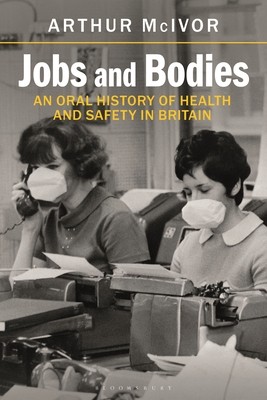
- We will send in 10–14 business days.
- Author: Arthur McIvor
- Publisher: Bloomsbury Academic
- ISBN-10: 1350236217
- ISBN-13: 9781350236219
- Format: 15.6 x 23.4 x 1.6 cm, minkšti viršeliai
- Language: English
- SAVE -10% with code: EXTRA
Reviews
Description
In the early 21st century, radically changing work locations and patterns have jolted society to reflect more on the ways that employment affects the body and the mind. This book provides historical context and insights to aid our understanding of this contemporary crisis, critically examining the history of a neglected area drawing from an extensive array of sources.
Arthur McIvor explores the history of health and safety from First World War to the present, drawing extensively upon workers' own personal stories of occupational accidents, disasters, injury, disease, overwork and disability. It covers a wide range of workplace issues, from stories of TNT poisoning and overwork in wartime, through to the asbestos and black lung disasters, and the modern-day 'epidemics' of stress, burn-out and Covid-19. Opening conversations surrounding the harms caused by work, this book analyses how people have lived with occupational illness and disability, critiquing risk and work-health cultures, and the economic violence characteristic of industrial capitalism and neoliberal economics, in addition to discussing the agency of big business and advocacy of workers and victims. Focusing on class, gender, disability and race, this book uses an impressive array of primary sources, including government reports and enquiries drawing upon workers' testimonies, Mine and Factory Inspectors Reports, HSE papers, newspapers and trade union records.EXTRA 10 % discount with code: EXTRA
The promotion ends in 23d.18:34:37
The discount code is valid when purchasing from 10 €. Discounts do not stack.
- Author: Arthur McIvor
- Publisher: Bloomsbury Academic
- ISBN-10: 1350236217
- ISBN-13: 9781350236219
- Format: 15.6 x 23.4 x 1.6 cm, minkšti viršeliai
- Language: English English
In the early 21st century, radically changing work locations and patterns have jolted society to reflect more on the ways that employment affects the body and the mind. This book provides historical context and insights to aid our understanding of this contemporary crisis, critically examining the history of a neglected area drawing from an extensive array of sources.
Arthur McIvor explores the history of health and safety from First World War to the present, drawing extensively upon workers' own personal stories of occupational accidents, disasters, injury, disease, overwork and disability. It covers a wide range of workplace issues, from stories of TNT poisoning and overwork in wartime, through to the asbestos and black lung disasters, and the modern-day 'epidemics' of stress, burn-out and Covid-19. Opening conversations surrounding the harms caused by work, this book analyses how people have lived with occupational illness and disability, critiquing risk and work-health cultures, and the economic violence characteristic of industrial capitalism and neoliberal economics, in addition to discussing the agency of big business and advocacy of workers and victims. Focusing on class, gender, disability and race, this book uses an impressive array of primary sources, including government reports and enquiries drawing upon workers' testimonies, Mine and Factory Inspectors Reports, HSE papers, newspapers and trade union records.

Reviews